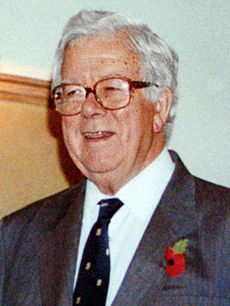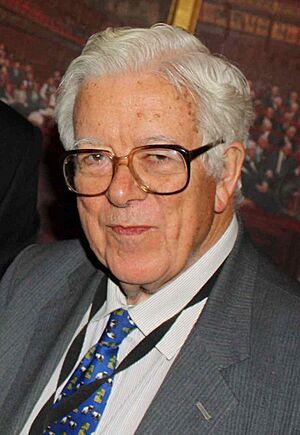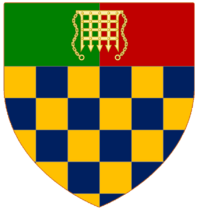Geoffrey Howe facts for kids
Quick facts for kids
The Lord Howe of Aberavon
|
|||||||||||||||||||||||||||||||||||
|---|---|---|---|---|---|---|---|---|---|---|---|---|---|---|---|---|---|---|---|---|---|---|---|---|---|---|---|---|---|---|---|---|---|---|---|

Howe in 2003
|
|||||||||||||||||||||||||||||||||||
| Deputy Prime Minister of the United Kingdom | |||||||||||||||||||||||||||||||||||
| In office 24 July 1989 – 1 November 1990 |
|||||||||||||||||||||||||||||||||||
| Monarch | Elizabeth II | ||||||||||||||||||||||||||||||||||
| Prime Minister | Margaret Thatcher | ||||||||||||||||||||||||||||||||||
| Preceded by | The Viscount Whitelaw (de facto, 1988) | ||||||||||||||||||||||||||||||||||
| Succeeded by | Michael Heseltine (1995) | ||||||||||||||||||||||||||||||||||
|
|||||||||||||||||||||||||||||||||||
| In office 24 July 1989 – 1 November 1990 |
|||||||||||||||||||||||||||||||||||
| Prime Minister | Margaret Thatcher | ||||||||||||||||||||||||||||||||||
| Preceded by | John Wakeham | ||||||||||||||||||||||||||||||||||
| Succeeded by | John MacGregor | ||||||||||||||||||||||||||||||||||
| Secretary of State for Foreign and Commonwealth Affairs | |||||||||||||||||||||||||||||||||||
| In office 11 June 1983 – 24 July 1989 |
|||||||||||||||||||||||||||||||||||
| Prime Minister | Margaret Thatcher | ||||||||||||||||||||||||||||||||||
| Preceded by | Francis Pym | ||||||||||||||||||||||||||||||||||
| Succeeded by | John Major | ||||||||||||||||||||||||||||||||||
| Chancellor of the Exchequer | |||||||||||||||||||||||||||||||||||
| In office 4 May 1979 – 11 June 1983 |
|||||||||||||||||||||||||||||||||||
| Prime Minister | Margaret Thatcher | ||||||||||||||||||||||||||||||||||
| Preceded by | Denis Healey | ||||||||||||||||||||||||||||||||||
| Succeeded by | Nigel Lawson | ||||||||||||||||||||||||||||||||||
|
|||||||||||||||||||||||||||||||||||
|
|||||||||||||||||||||||||||||||||||
|
|||||||||||||||||||||||||||||||||||
| Personal details | |||||||||||||||||||||||||||||||||||
| Born |
Richard Edward Geoffrey Howe
20 December 1926 Port Talbot, Glamorgan, Wales |
||||||||||||||||||||||||||||||||||
| Died | 9 October 2015 (aged 88) Idlicote, Warwickshire, England |
||||||||||||||||||||||||||||||||||
| Political party | Conservative | ||||||||||||||||||||||||||||||||||
| Spouse | |||||||||||||||||||||||||||||||||||
| Children | 3 | ||||||||||||||||||||||||||||||||||
| Alma mater | Trinity Hall, Cambridge | ||||||||||||||||||||||||||||||||||
| Occupation |
|
||||||||||||||||||||||||||||||||||
| Military service | |||||||||||||||||||||||||||||||||||
| Branch/service | |||||||||||||||||||||||||||||||||||
| Rank | Lieutenant | ||||||||||||||||||||||||||||||||||
| Unit | Royal Corps of Signals | ||||||||||||||||||||||||||||||||||
Richard Edward Geoffrey Howe, also known as Lord Howe of Aberavon, was a British politician. He was a member of the Conservative Party. He served as Deputy Prime Minister of the United Kingdom from 1989 to 1990.
Geoffrey Howe was a very important minister in Margaret Thatcher's government. He held several top jobs, including Chancellor of the Exchequer (in charge of the country's money), Foreign Secretary (in charge of relations with other countries), and Leader of the House of Commons. His decision to resign in November 1990 is often seen as a key moment that led to Margaret Thatcher's own resignation a few weeks later.
Contents
Early Life and Education
Geoffrey Howe was born in 1926 in Port Talbot, Wales. His father was a lawyer. Geoffrey described himself as having Scottish, Cornish, and Welsh family roots.
He went to three different private schools. He wasn't very interested in sports, but he loved debating. During World War II, he was active in the school's Home Guard, which helped protect the country. He also enjoyed photography and movies.
Geoffrey was very good at studying ancient languages (Classics). He was offered a place at Trinity Hall, Cambridge University in 1945. Before university, he joined the army for his National Service. He became a Lieutenant in the Royal Corps of Signals and served in East Africa. While there, he gave talks in Swahili about politics and even climbed Mount Kilimanjaro.
After leaving the army, he studied Law at Cambridge. He became the chairman of the university's Conservative Association. In 1952, he became a barrister, which is a type of lawyer, and worked in Wales. In 1953, he married Elspeth Shand. They had three children. He later became a Queen's Counsel (QC) in 1965, which is a senior lawyer.
Howe also started his political career. He ran for Parliament in his home area of Aberavon in 1955 and 1959, but he lost because it was a strong area for the Labour Party.
He helped create the Bow Group, which was a group of "young modernisers" within the Conservative Party in the 1950s. He was one of its first leaders. Through this group, he promoted ideas about free markets, which later became known as Thatcherism.
Early Political Career
Member of Parliament
Geoffrey Howe became a Member of Parliament (MP) for Bebington in 1964. He quickly became known for his skills and was promoted to speak for the opposition on welfare and labour policy. However, he lost his seat in the 1966 election.
He then returned to working as a lawyer. He was involved in important inquiries, including one into the Aberfan Disaster Tribunal and another into the treatment of patients with intellectual disabilities in hospitals. These inquiries helped change laws and improve care.
Howe returned to the House of Commons as an MP in 1970, first for Reigate and then for East Surrey. In 1970, he was made Solicitor General for England and Wales in Edward Heath's government and received a knighthood. He helped create the Industrial Relations Act 1971, which led to some strikes by trade unions. In 1972, he was promoted to Minister of State at the Department of Trade and Industry.
Shadow Cabinet Roles
After the Labour Party won the election in 1974, Howe became a spokesman for social services in the Conservative Party. He ran for leader of the Conservative Party in 1975, but Margaret Thatcher won. She saw him as someone who shared her ideas, and she made him Shadow Chancellor of the Exchequer. In this role, he helped develop new economic policies for the party.
During this time, the Labour Chancellor, Denis Healey, famously said that being criticised by Howe was "like being savaged by a dead sheep." This was a humorous way of saying Howe seemed quiet and gentle, but his words could still be powerful.
Working with Margaret Thatcher
Chancellor of the Exchequer
When the Conservatives won the 1979 election, Howe became Chancellor of the Exchequer. This meant he was in charge of the country's finances. He introduced big changes to the economy. These included shifting taxes from income to goods and services, trying to control inflation, and removing rules that limited how much money could be moved in and out of the country.
His budget in 1981 was very important. At the time, many economists thought it was a bad idea because it aimed to slow down inflation during a recession. However, Howe believed that by reducing the government's debt and controlling inflation, interest rates would fall, which would help the economy in the long run. His policies did help reduce inflation and interest rates, and the economy slowly improved. However, unemployment also increased significantly during this period.
In 1981, after riots in Liverpool, Howe wrote a note suggesting that the government should not spend too much money trying to fix problems in Liverpool. He mentioned the idea of "managed decline," which meant letting some areas decline if they were too difficult to improve. He later said he was just warning about focusing too many resources on one area.
Foreign Secretary
After the 1983 election, Margaret Thatcher made Howe the Foreign Secretary. He held this job for six years, which was a very long time. He travelled to many countries, including those in Eastern Europe, and met with world leaders. He played a key role in discussions with Mikhail Gorbachev, the leader of the Soviet Union, which helped lead to the end of Communism in Europe.
Howe was also involved in talks about the future of Hong Kong with China in 1984. He worked well with the US Secretary of State, George Shultz, just as Thatcher had a close relationship with President Ronald Reagan.
However, Howe and Thatcher started to have disagreements, especially about Britain's relationship with the European Community. Howe was known for being polite and good at negotiating, while Thatcher had a more direct and strong style. These differences caused stress between them.
Deputy Prime Minister
In July 1989, Howe was moved from Foreign Secretary to Leader of the House of Commons and Deputy Prime Minister. This was generally seen as a step down for him. His relationship with Thatcher became more difficult.
During this time, the government was becoming unpopular because of a new tax called the "poll tax." Howe suggested that the government should listen more to the public.
Disagreements with Thatcher
Howe and Thatcher had disagreements on several issues. During the Falklands War in 1982, Thatcher did not include him in her small war cabinet. They also disagreed about Britain's role in Europe. Howe supported closer ties with Europe and joining the European Exchange Rate Mechanism (ERM), which would link the British pound to other European currencies. Thatcher was strongly against this.
Their disagreements became very public. In October 1990, at a meeting in Rome, Thatcher famously said "no, no, no" to plans for closer European integration. Howe had a different view.
Resignation and its Impact
Geoffrey Howe resigned from the government on 1 November 1990. On 13 November, he gave a very important speech in the House of Commons. In his speech, he criticised Margaret Thatcher for taking risks with the country's future and for undermining her own ministers' policies on Europe.
This speech is widely seen as the main reason why Michael Heseltine challenged Thatcher for the leadership of the Conservative Party a few days later. Although Thatcher won the first round of the leadership election, she didn't win by enough votes and decided to resign on 22 November. John Major then became the new Prime Minister. This change helped the Conservative Party, which had been behind in opinion polls, to win the next general election in 1992.
Retirement
Geoffrey Howe left the House of Commons in 1992. He was then made a life peer as Baron Howe of Aberavon, which meant he could sit in the House of Lords. He published his life story, called Conflict of Loyalty, in 1994. In the House of Lords, he continued to speak about foreign policy and European issues. He retired from the House of Lords in 2015.
After leaving Parliament, Howe held several positions in business and law. His wife, Elspeth, also became a life peer, which is rare for a married couple to both hold titles in their own right.
Howe was known for being a kind and well-liked person in politics. Many colleagues described him as one of the most honest and decent politicians. He died on 9 October 2015, at the age of 88, after a suspected heart attack.
Arms
|
Images for kids
See also
 In Spanish: Geoffrey Howe para niños
In Spanish: Geoffrey Howe para niños
 | James Van Der Zee |
 | Alma Thomas |
 | Ellis Wilson |
 | Margaret Taylor-Burroughs |





